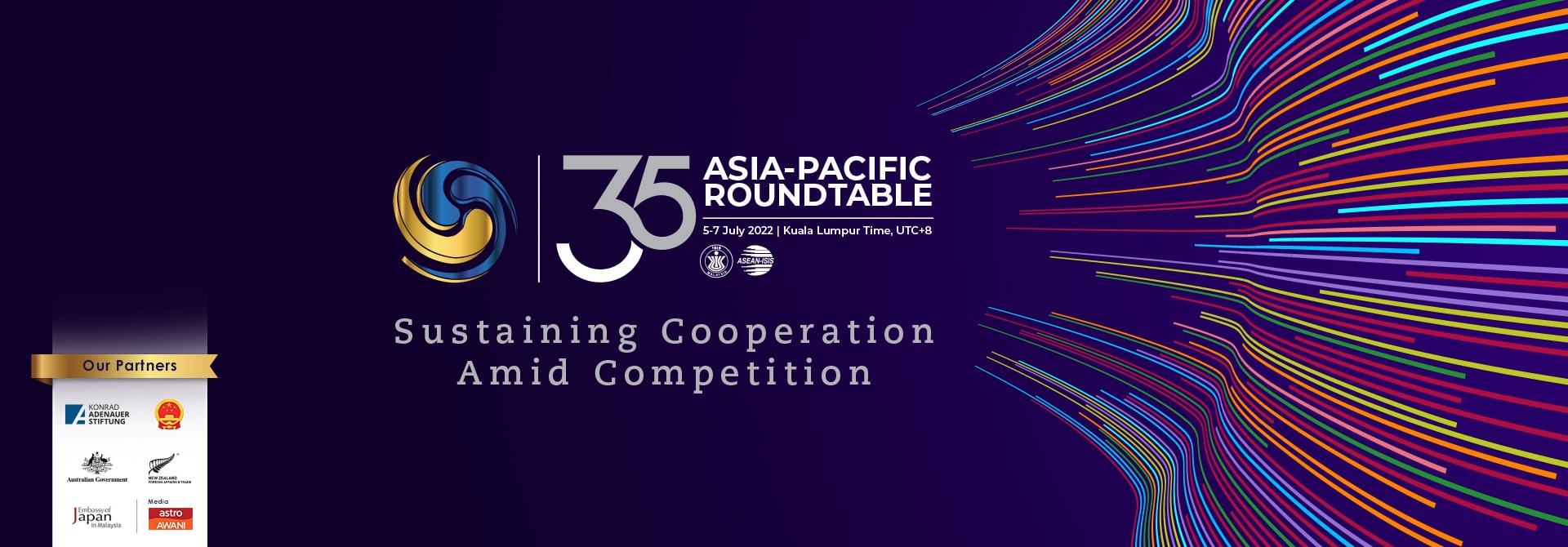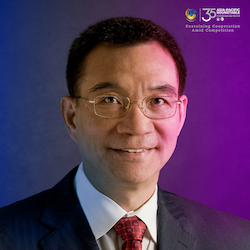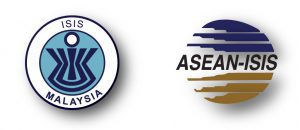

35th Asia-Pacific Roundtable
5-7 July 2022
Kuala Lumpur Time, UTC+8
Media
The Asia-Pacific Roundtable (APR) is the signature international conference of the Institute of Strategic & International Studies (ISIS) Malaysia.
As one of the region’s key Track Two strategic conferences, the APR was postponed for the first time in 2020 because of the Covid-19 pandemic.
Hosted by ISIS Malaysia, on behalf of the Asean-ISIS Network, a network of leading Southeast Asian policy institutes and think-tanks, it regularly attracts more than 300 thinkers of various backgrounds who engage in lively, frank and constructive conversations on issues impacting on the security, stability, sustainability and prosperity of the Asia-Pacific region.
Sustaining Cooperation Amid Competition
This year, the 35th APR will focus on sustaining cooperation amid competition. It reflects the condition of the region that remains in the throes of strategic and major power competition while stakeholders continue to find ways of cooperation to mitigate the damaging aspects of competition.
It is also an acknowledgement of the growing importance of climate and sustainability related challenges in the region that will impact existing strategic security challenges and equations.
Remarks and keynote video
Day 1 – Tuesday, 5 July 2022
(All times in UTC+8)
Participants and role-players admitted to ‘networking / waiting room’

Hoang Anh Tuan

Herizal Hazri

Dato’ Sri Ismail Sabri Yaakob
China’s Dual-Circulation Strategy (DCS) aims to strengthen its domestic market and technological capabilities while balancing foreign economic activities amid a volatile global economy. As the second largest economy in the world, the DCS has immense economic and geopolitical implications on supply chains, trading relationships and growth. How does this strategy change the way China engages with the world? What role does the DCS play in post-pandemic recovery and the region? And what does China’s aspiration for technological self-reliance mean in the context of the US-China competition?
Instigator
Main remarks

Yose Rizal Damuri

Ouyang Yujing
Speakers

Simon Tay

Justin Yifu Lin

Asei Ito

Jane Golley

Justin Lee
MEDIA CENTRE
Day 2 – Wednesday, 6 July 2022
(All times in UTC+8)
Participants and role-players admitted to ‘networking / waiting room’
Asia-Pacific is projected to be one of the hardest-hit regions from climate change. Among the key outcomes of the 2021 United Nations Climate Change Conference (COP26) to mitigate its effects are strengthened targets to curb greenhouse gas emissions, phasing down of coal, phasing out fossil fuel subsidies and financial support for developing countries. Yet, there is the risk of backtracked and unmet commitments. What are the most pressing challenges for the region? How would they impact on strategic security and trade concerns? Will COP26 catalyse a transition point for climate action? How can countries adapt to climate change?
Instigator

Alizan Mahadi
Speakers

Sangmin Nam

Chhinh Nyda

Polly Hemming

Tom Moody

Norbert Lammert
The “Indo-Pacific” construct, once considered contentious in Europe, is now at the heart of its engagement with Asia-Pacific. The European Union’s (EU) Strategy for Cooperation in the Indo-Pacific outlines its engagement approach. What are some of the key features of the strategy and how can they be realistically operationalised? How will the EU balance between economic and strategic approaches, including in the maritime domain? What is the value-add that the EU can bring to the region, specifically to Asean? Could a more proactive and structured European engagement temper conflicting interests from other Dialogue Partners?
Instigator

Nguyen Nam Duong
Speakers

Michalis Rokas

Maria Thaemar C. Tana

Rahul Mishra

Frederick Kliem

Stuart Calman
Day 3 – Thursday, 7 July 2022
(All times in UTC+8)
Participants and role-players admitted to ‘networking / waiting room’
Recent unilateral decisions by nuclear-weapon states in Asia-Pacific to modernise and rearm their deterrence capabilities have reignited concerns of a new nuclear arms race. These developments are exacerbated by declining effectiveness of arms control regimes and overlaps between the nuclear and conventional weapon delivery systems. Will technological advancements, such as “missile renaissance”, threaten the capability and survivability of second-strike systems of nuclear weapon states? Are there more effective approaches to arms control? What options are there for non-nuclear-weapon states to mitigate these developments?
Instigator
Speakers

Dell Higgie

Tong Zhao

Manpreet Sethi

Andhika Prawira
A feature of ongoing major power competition in Asia-Pacific has been the proliferation and entrenchment of new and competing multi- and mini-lateral mechanisms. These include the Quadrilateral Security Dialogue, the Aukus trilateral pact and a revised Belt and Road Initiative. Could such developments and their impacts undermine Asean-centred mechanisms? Are there opportunities for cooperation with competing initiatives? What are the conditions for Asean to engage and recalibrate its strategic responses in the face of these developments?
Instigator

Melissa Conley Tyler
Speakers

Dino Patti Djalal

Sarah Teo

Aries A. Arugay

Alizan Mahadi
MEDIA STATEMENT
CONTACT US
Please contact Atikah Ishak (atikah@isis.org.my) for information on sponsoring the 35th Asia-Pacific Roundtable.
PARTNERS

ORGANISERS






